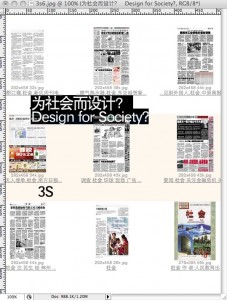着装:为庆祝地球日,请着绿色或褐色服装,并心中有“树”!
DRESSING CODE: Please wear green and/or brown for the celebration of “Earth Day”, think “tree”!
为社会而设计?
Design for Society
时间:2009年 4月25日下午14:30~16:30
地点:数字天地—上海电子艺术创意产业基地1号楼 2层会议室
徐汇区石龙路395号(靠近永川路)
[组织人] 三术媒体中心:刘妍,阿角
[合作方] 上海电子艺术节
主讲人:
伦敦皇家艺术学院设计师Onkar Singh Kular, Sebastien Noel 与他们的研究生们
设计曾经在80年代有过狂热的十年。例如,在英国, “设计产业在十年内增长了35%,销售额和赢利在同一个期间成长了三倍”。 (怀特里,1993) 然而,之后情型巨变。 “随着经济的衰退,设计泡沫爆炸了。 十年里迅速成长起来的同样设计师面临了严重的财政困难甚至被忘却”。(怀特里,1993)
在中国,设计仍然是兴旺的产业。 “从中国制造到中国创造”,这个口号正在鼓吹民族主义精神,试图让我们相信它就是一把解决一切经济问题和社会问题的最理想的万能钥匙。 与此同时,设计师在中国涌现成为新的名人行业,设计型产品享受着美丽的荣誉并被人渴求。 受到怀特里1993的著作“为社会而设计”的启发,我们现在想知道的是: 在我们目前的经济危机形势之下,中国设计业的过分“蓬勃”发展与泡沫炒作是否会阻塞它的良性发展而成为发展道路上自己的最坏的敌人? 或者它是否会提供给我们解决经济危机和我们的社会问题的方案的最根本的依据?
为了回答这些问题,我们需要了解消费者导向设计在西方的历史发展并和开始重新检视当前中国社会系统中的“消费者导向设计”的方向与价值。 为此,我们特别邀请伦敦皇家艺术学院两位知名设计师Onkar Kular和Sebastien Noel与他们的研究生们介绍他们的“13平台”与他们的作品。我们还特别邀请了中国设计界的朋友介入讨论设计在我们当前社会的角色和状况,并总结影响我们未来行动的关键因素。
douban event
Design for Society?
Time: 14:30~16:30, April 25, 2009
Location: Shanghai eArts Community, No.395 Shi Long Rd.
(near Yongchuan Road), Xuhui District
Organized by Liu Yan and Aaajiao of 3S Media Center
In collaboration with Shanghai eARTS Festival
It was a frantic decade of design in the 1980’s. In Britain, for example, “the design industry grew by 35 percent a year for most of the decade. Turnover and profits trebled in the same period.” (Whiteley, 1993)
However, much has changed afterwards. “Following after a sharp economic recession, the design bubble burst. By the turn of the decade the same designers were more likely to be ran into severe cash flow difficulties or even crashed into oblivion.” (Whiteley, 1993)
In China, design is still the booming industry. “From made in China to created in China”, this is now superficially stimulating a nationalism spirit against western influences and creating an image that deliver us with solutions for economic evils and social problems. Designer is emerging to become the new celebrity profession in China, designer goods too connoted prestige and desirability. Inspired by Nigel Whiteley’s book “Design For Society”, we are now questioning ourselves: under the current collapse of our economic system, will the design boom in China become its own worst enemy and choked on the froth of its own hype? Or will it become the basis of the solution of the economic crisis and our society’s problems?
In order to answer these questions, we need to be aware of the historical development of consumer-led design in the west and start to undertake a critical examination of the consumerist system of design in our society. By doing so, we have invited Onkar Singh Kular, Sebastien Noel and their students from Platform 13 of Royal College of Art(London) to talk about their project and some design works. After that, our Chinese panelists will join the discussion to assess the current role and status of design in our society and draw conclusions on what is then the prerequisite for considered future action.
Platform 13 starts from the premise that our current global society, with its prevailing techno-political system, faces challenges of an unprecedented scale.
We are asking ourselves how Design can contribute to alternative models of living and production by engaging with, commenting on, and addressing issues currently beyond the usual scope of design – political, social, technological or ecological. We are exploring the potential of creating tangible objects or interventions which impact at a social or behavioural level, by engaging with new methods of production and dissemination.
Tutors: Onkar Kular, Sebastien Noel
Students: Jen Hui Liao, Vahakn Matossian-Gelhaar, Matthew Plummer-Fernandez, Julian Bond, David Hood, Hwang Kim, Jorge Manes Rubio, Benjamin Newland, Shunsuke Tanaka (PEP)
About Onkar Singh Kular
Onkar Singh Kular, born 1974 in Huddersfield, West Yorkshire, studied Product and Furniture Design at Kingston University before going on to the Royal College of Art to complete a masters in Design Products. Onkar uses design as a medium to engage with a broad range of social and cultural issues, from the quest for domestic perfection to baking super functional bread. His work has been exhibited internationally in London, Tokyo, Jerusalem, Rotterdam and Barnsley and is sold and distributed by Droog Design in Holland and Trico in Tokyo.
He is currently a research fellow in the Design Interactions department at the RCA working with the Tussauds Group. Onkar also teaches Product Design at Kingston University and Architecture at the London Metropolitan University.
His Projects include:
The Wonderful World of Bread
Sony PSP
Machines for Living
About Sebastien Noel(Trokia):
Founded in 2003 by Sebastien Noel ,Conny Freyer and Eva Rucki, this multi-disciplinary art and design practice draws on its members’ multi-disciplinary backgrounds in product and communication design to focus on the cross-contamination of arts and design disciplines to develop projects both engaging and demanding to the user, where design and information never stray far from each other. Working on both self-initiated and commissioned projects, their development processes are born out of a mutual love for simplicity, playfulness and an essential desire for provocation. They believe that design should be envisaged in the broader sense of communication art, to explore the cultural function of objects beyond our culture of innovation for its own sake. They develop alternative ways of approaching the design of objects, thinking of them as gateways to a narrative or an experience, to reintroduce elements of magic, surprise, sensual experience, and dialogue.Troika have recently worked for clients such as MTV International, Warner Music UK, Thames & Hudson, The Science Museum, Artwise Curators, and British Airways. Recent Troika projects include the SMS Guerrllla Projector, the Tool for Armchair Activists well as the Schizoporotica, Troika’s re-invention of the music box. In 2006, Troika was awarded £35.000 start-up funding from NESTA, the National Endowment for Science, Technology and the Arts. The Guerilla Projector is a home-made, fully functioning device that enables the user to project text-based SMS messages in public spaces, in the street, onto other people, inside cinemas, shops, houses…







